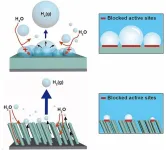(Press-News.org)
· Long genes have more potential sites for DNA damage
· Genes involved in brain loss during aging and linked to Alzheimer’s are very long
· New view of biological aging differs from previous beliefs
CHICAGO --- What causes our body to age? Four complementary studies, including one from Northwestern Medicine, have come to the same conclusion: long genes.
In a new paper, the scientists write about their findings and how they advance existing knowledge about aging.
“Long genes that become less active with age may be the central cause of aging in our bodies,” said co-corresponding author Thomas Stoeger, assistant professor of medicine in pulmonary and critical care at Northwestern University Feinberg School of Medicine and a member of the Potocsnak Longevity Institute. “Our finding advances the field by identifying a single phenomenon that connects most existing knowledge about aging and makes this underlying phenomenon measurable.”
The paper, which highlighted the shared findings of four international research groups, was published in Trends in Genetics on March 21. The groups are the first to arrive at the conclusion that most aspects of biological aging relate to gene length.
Conditions known to accelerate aging decrease the activity of long genes. This includes smoking, alcohol, oxidative stress and UV-irradiation. Conditions known to slow aging increase the activity of long genes such as caloric restriction. Also, genes that are very short or very long encode for cellular processes known to change in aging such as the formation of cellular energy, protein synthesis and transmission of neural signals.
“The regulation of genes is one of the most central processes of life, and our four studies explain why the activity of long genes in particular change in aging,” Stoeger said. “In addition to aging, we show that the same finding occurs in patients with Alzheimer’s disease, an age-associated disease. Our findings help us rethink causes of neurodegenerative diseases such as Alzheimer’s disease. Because genes with neural function are unusually long, we hypothesize that the decreased activity of long genes cells fails to produce sufficient biomaterials to properly maintain neural function.”
The trigger of aging is a physical phenomenon related to the length of the genes and not to the specific genes involved or the function of those genes, the scientists report. The original findings were based on a mixture of molecular data from humans, mice, rats, killifish, C. elegans, D. melanogaster and experiments in mice. Previously scientific research sought to identify specific genes responsible for aging. This new view differs from prevailing biological approaches that study the effects of single genes.
Long genes simply have more potential sites that could be damaged. The scientists compare it to a road trip — the longer the trip, the more likely that something will go wrong. And because the physiological roles of some cell types rely upon genes that are longer than those of other cell types, some cell types are more likely to be affected by DNA damage that accumulates as they age. During aging, genes take damage as the strands of DNA that contain the genes break. This stops cells from reading the information and activating the information contained in the gene. The longer the gene, the more likely it is that at least one DNA damage site exists and stops the gene’s activation.
Because neural cells are known to rely on particularly long genes and are slow or non-dividing, they are especially susceptible to the phenomenon. Many of the genes involved in brain loss during aging and associated with Alzheimer’s disease are exceptionally long. Pediatric cancer patients, who are cured by DNA-damaging chemotherapy, later suffer from premature aging, including neurodegeneration.
The title of the article is “Time is ticking faster for long genes in aging.”
The research from Northwestern was supported by grant R00AG068544 from the National Institute on Aging of the National Institutes of Health.
Additional authors include:
Jan Hoeijmakers: Erasmus MC, Netherlands; University of Cologne, Germany; Oncode Institute, Netherlands;
Ander Izeta: Biogipuzkoa Health Research Institute, Spain; Tecun-University, Spain;
Olga Ibáñez-Solé: Biogipuzkoa Health Research Institute, Spain; University of Cologne, Germany; and
Sourena Soheili-Nezhad: Max Planck Institute for Psycholinguistics, Netherlands
END
Water eletrolysis process is a system that produces hydrogen by electrolyzing water. It is an eco-friendly technology that can produce hydrogen fuel, a future energy source, without emitting environmental pollutants, but its limitations have been pointed out as low hydrogen production efficiency and high production costs. Recently, a team of researchers from Pohang University of Science and Technology (POSTECH) published research that solved both problems at once, attracting attention.
A collaborative research team comprising Professor Jong Kyu Kim, Jaerim Kim, a Ph. D. candidate, Professor ...
Scientists believe that planetary systems like our solar system contain more rocky objects than gas-rich ones. Around our sun, these include the inner planets – Mercury, Venus, Earth and Mars – the asteroid belt and the Kuiper belt objects such as Pluto.
Jupiter, Saturn, Uranus and Neptune, on the other hand, contain mostly gas. But scientists also have known for a long time that planet-forming disks start out with 100 times more mass in gas than solids, which leads to a pressing question: When ...
Imagine if every time you saw a face, it appeared distorted. Well, for those who have a very rare condition known as prosopometamorphopsia (PMO), which causes facial features to appear distorted, that is reality.
As the Dartmouth-based website about prosopometamorphopsia explains, "'Prosopo' comes from the Greek word for face 'prosopon' while 'metamorphopsia' refers to perceptual distortions.''' Specific symptoms vary from case to case and can affect the shape, size, color, and position ...
VIDEO available to download HERE of scientist Ruchi Gupta explaining how she hopes to make a lollipop or lozenge to diagnose mouth cancer. The film features mouth cancer survivor Rachel Parsons and contains explicit images.
A ‘LOLLIPOP’ that can diagnose mouth cancer early could become a reality, thanks to a pioneering project funded by Cancer Research UK and the Engineering and Physical Sciences Research Council (EPSRC).
Dr Ruchi Gupta at the University of Birmingham has been awarded £350,000 over the next three years by Cancer Research UK and EPSRC to make a prototype flavoured ‘lollipop’ from a material called a smart hydrogel.
Smart ...
At the close of 2023, Defra asked the British Ecological Society to bring together nearly 40 experts, to collate expert opinion on freshwater policy and set out a list of priorities for the biodiversity evidence programme to focus on. Published today, the new report sets out priorities for restoring England’s polluted fresh waters.
We know that England’s rivers, and the life they support, are in a desperate state. The River Trust’s annual State of Our Rivers report found that a mere 15% of rivers in England were classed as being in good ecological health and no ...
NASA’s BurstCube, a shoebox-sized satellite designed to study the universe’s most powerful explosions, is on its way to the International Space Station.
The spacecraft travels aboard SpaceX’s 30th Commercial Resupply Services mission, which lifted off at 4:55 p.m. EDT on Thursday, March 21, from Launch Complex 40 at Cape Canaveral Space Force Station in Florida. After arriving at the station, BurstCube will be unpacked and later released into orbit, where it will detect, locate, and study short gamma-ray ...
Women experience disruptions in their sleep patterns and report heightened feelings of anger in the days leading up to their period, according to new research.
The study sheds new light on the intricate relationship between women's menstrual cycles, emotions, and sleep patterns.
Co-author Dr Jo Bower, of the University of East Anglia’s School of Psychology, said: “Our research provides valuable insights into the complex interplay between menstrual cycles, emotions, ...
Milan, Italy: Patients with breast cancer that has started to spread to the lymph nodes in the armpit can safely avoid extensive removal of the lymph nodes if their treatment is tailored to their response to cancer-killing therapies such as chemotherapy before surgery.
In a presentation to the 14th European Breast Cancer Conference today (Friday) in Milan, Annemiek Van Hemert, a doctor and PhD student in the Surgical Oncology Department of Antoni van Leeuwenhoek-Netherlands Cancer Institute (AVL-NKI) in Amsterdam (The Netherlands), said: “If we are able to predict the response based on the removal of ...
*This is an early press release from the European Congress on Obesity (ECO 2024) Venice 12-15 May. Please credit the Congress if using this material*
New research being presented at this year’s European Congress on Obesity (ECO) in Venice, Italy (12-15 May), suggests that replacing sugar-sweetened food and drinks with low/no energy sweetened products can help weight control for at least one year after rapid weight loss in adults, without increasing the risk of type 2 diabetes or cardiovascular disease.
The findings of a year-long randomised controlled trial involving adults with overweight and obesity and children in the overweight range from Northern, Central and ...
BOSTON (MA), March 21, 2024 – This July, the 13th annual International Space Station Research and Development Conference (ISSRDC) returns to Boston, where leaders from the commercial sector, U.S. government agencies, and academic communities will assemble to highlight innovations and opportunities through our nation’s orbiting outpost. ISSRDC will take place July 30-August 1, 2024, at the Marriott Copley Place in Boston. Early registration is now open until May 24, 2024. Booking during early ...





